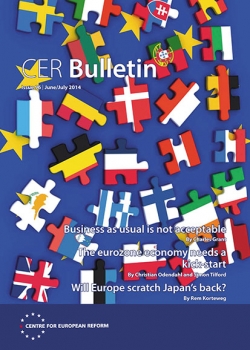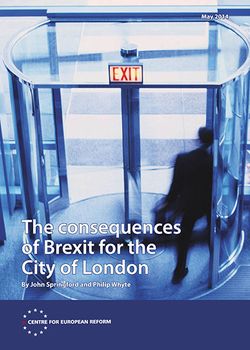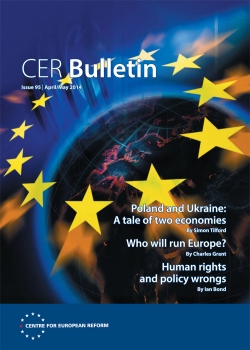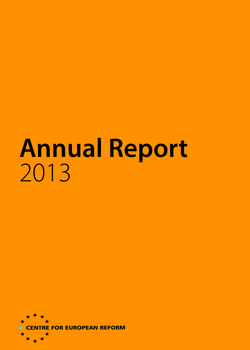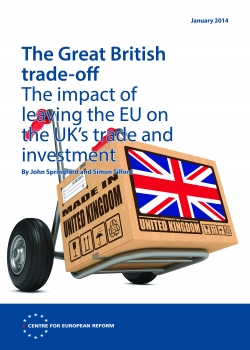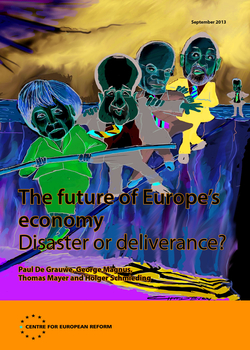Single market, competition & trade
Issue 96 - 2014
06 June 2014
- Business as usual is not acceptable, Charles Grant
- The eurozone economy needs a kick-start, Christian Odendahl, Simon Tilford
- Will Europe scratch Japan's back?, Rem Korteweg
The eurozone economy needs a kick-start
06 June 2014
With just as many reasons for pessimism as for optimism in the eurozone, policy-makers need to further stimulate demand and pursue more targeted reforms.
Presidential candidates, European federalism and Tony Giddens
15 May 2014
The problem with ‘federalism’ is that most European citizens do not want it. This makes the federalist proposals in Tony Giddens’ new book unrealistic.
The consequences of Brexit for the City of London
08 May 2014
If Britain leaves the EU, the City of London will lose access to European markets – unless the UK aligns its financial rules with those of the EU.
Quantitative easing alone will not do the trick
28 April 2014
In the eurozone, quantitative easing by itself is unlikely to be effective. The European Central Bank needs to change the way it manages people’s expectations, too.
Why a British exit is not inevitable
17 April 2014
Lord Ashcroft’s polling shows that pro-Europeans can win an in/out referendum. But what are the best arguments to use in such a campaign?
Issue 95 - 2014
31 March 2014
- Poland and Ukraine: A tale of two economies, Simon Tilford
- Who will run Europe?, Charles Grant
- Human rights and policy wrongs, Ian Bond
Poland and Ukraine: A tale of two economies
31 March 2014
The EU finally needs to fulfil its moral obligation to Ukraine: to treat it like any other sovereign country trying to escape Russia's grasp.
The eurozone's ruinous embrace of 'competitive devaluation'
10 March 2014
Instead of being criticised for pursuing competitive devaluations, eurozone countries that manage to devalue their real exchange rates are extolled as an example for others.
French federalists propose a Euro Community
03 March 2014
A group of French thinkers wants to establish a federal 'Euro Community'. Their scheme could harm the single market and make Britain's position in the EU uncomfortable.
Annual report 2013
10 February 2014
Charles Grant discusses the challenges facing the EU in 2014, such as the European elections, Britain's slide towards the exit and the continuing travails of the eurozone.
What explains Europe's rejection of macroeconomic orthodoxy?
05 February 2014
European policy-makers' rejection of both Keynesianism and monetarism has cut economic growth, raised debt and increased the risk of deflation.
The Great British trade-off: The impact of leaving the EU on the UK's trade and investment
20 January 2014
Eurosceptics think Britain can leave the EU and still have access to its markets. But to do so, Britain will have to sign up to EU rules.
Why Germany’s trade surplus is bad for the eurozone
29 November 2013
In late October, the US singled out Germany as a threat to the global economy. The Treasury issued a report saying that Germany’s current account surplus – now around 7 per cent of GDP – imposes "a deflationary bias for the eurozone as well as for the world economy."
How to build a modern European Union
10 October 2013
The CER proposes reforming the EU’s policies and institutions, to foster a more dynamic European economy and to make decision-making more accountable.
Eurozone recovery: The world is not enough
04 October 2013
The eurozone is too big to rely on exports for economic growth. It needs policies suited to a large continental economy, not ones perfected by Germany.
What would a Brexit mean for EU competition policy?
30 September 2013
A British exit from the EU could have important repercussions for competition policy. Britain and the remaining EU countries would both be affected.
Issue 92 - 2013
27 September 2013
- Banking union – or Potemkin village?, Philip Whyte
- Europe cannot make up its mind about the US pivot, Rem Korteweg
- Whatever happened to the Schengen crisis?, Hugo Brady
Banking union – or Potemkin village?
27 September 2013
Since mid-2012, the eurozone crisis has been in remission. The period of relative calm which has prevailed since then has not been the product of an upturn in economic fortunes: until the recent summer uptick, the eurozone had suffered six consecutive quarters of declining activity and rising unemployment (a result in part of synchronised fiscal austerity across the region as a whole).
The future of Europe's economy: Disaster or deliverance?
18 September 2013
Four leading economists give widely divergent diagnoses of the eurozone's problems and very different policy prescriptions. The EU's future could depend upon which is right.









